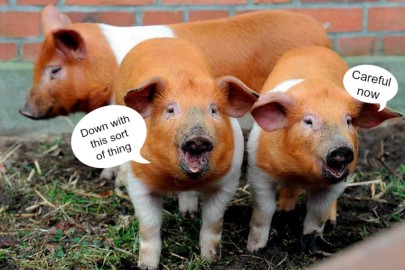
Prepare your brains for some seriously mind-mangling wordplay, with today’s weird Wikipedia article, unearthed by the Wikiworm.
“Buffalo buffalo Buffalo buffalo buffalo buffalo Buffalo buffalo” is a grammatical sentence in American English, used as an example of how homonyms and homophones can be used to create complicated linguistic constructs.
The sentence uses three meanings of the word buffalo: the city of Buffalo, New York, the somewhat uncommon verb “to buffalo” (meaning “to bully or intimidate”), as well as the animal buffalo (actually species of bison). When the punctuation and grammar are expanded, the sentence could read as follows: “Buffalo buffalo that Buffalo buffalo buffalo, buffalo Buffalo buffalo.” With the use of synonyms the sentence could become “Buffalo bison that other Buffalo bison bully, themselves bully Buffalo bison.”
The sentence uses a restrictive clause, so there are no commas, nor is there the word “which,” as in, “Buffalo buffalo, which Buffalo buffalo buffalo, buffalo Buffalo buffalo.” This clause is also a reduced relative clause, so the word that, which could appear between the second and third words of the sentence, is omitted.
The sentence can be clarified by substituting the synonym “bison” for the animal “buffalo”, “bully” for the verb “buffalo”, and “New York” to refer to the state of the city Buffalo:
- “New York bison New York bison bully, bully New York bison”, or:
- “New York bison whom other New York bison bully, themselves bully New York bison”.
Or, alternatively with the city name intact:
“Buffalo bison Buffalo bison bully bully Buffalo bison”.
Removing the classifier noun “Buffalo” (the city) further clarifies the sentence (note that the initial capital is retained as the common noun “buffalo” now starts the sentence):
“Buffalo buffalo buffalo buffalo buffalo.”
“Bison [that other] bison bully [also] bully bison.”
Thomas Tymoczko has pointed out that there is nothing special about eight “buffalos”; any sentence consisting solely of the word “buffalo” repeated any number of times is grammatically correct. The shortest is “Buffalo!”, which can be taken as an imperative instruction to bully someone (“[You] buffalo!”) with the implied subject “you” removed. Tymoczko uses the sentence as an example illustrating rewrite rules in linguistics.
Other English words can be used to make grammatical (but not necessarily meaningful) sentences of this form, containing endless consecutive repetitions. Any word that is both a plural noun and an uninflected transitive verb will work; for example, police, dice, perch. Adding a place name like Police, Poland, can allow for a sentence identical in structure to the Buffalo example, though not necessarily with uniform pronunciation: “Police police Police police police police Police police.” With head (of cattle), as there is an adjective ‘head’, there is no capitalisation necessary: “Head head head head head head head head”.
Any of these words can be mixed in any arbitrary pattern, such as “Police dice fish head buffalo”, although only Police, head, and Buffalo can be parsed as adjectives.
A somewhat similar non-punctuated example is “James while John had had had had had had had had had had had a better effect on the teacher“. This could concern a situation in an English class regarding the usage of the word had, and might be punctuated as, “James, while John had had ‘had’, had had ‘had had’; ‘had had’ had had a better effect on the teacher.”











I love these things. I did a quiz on Think of England based on them once. Other good ones:
‘Dogs dogs dogs bite bite bite.’
and
‘Badgers badgers badgers badger badger badger badgers badgers badger.’
…are both grammatically correct sentences.
aiieee my brain hurts! 😀
“Wenn hinter Fliegen fliegen Fliegen, Fliegen Fliegen fliegen nach.”
Can’t say if I didn’t mess up the capitalisation!
This reminds me of a chinese tongue-twister. The english translation is:
Four is four, ten is ten, fourteen is fourteen, forty is forty, forty-four is forty-four
Now the words for ‘four’, ‘ten’, and ‘is’ are very similar. ‘Four’ sounds like ‘zuh’ (sì) and ‘ten’ and ‘is’ sound more like ‘shuh’ with different inflections (shí and shì). For the larger numbers, fourteen is ‘ten-four’, forty is ‘four-ten’, and forty-four is ‘four-ten-four’. When you put it all together it’s near impossible to follow (for me at least.)
Sì shì sì shí shì shí shí sì shì shí sì sì shí shì sì shí sì shí sì shì sì shí sì
Hurl the odd ‘t’ in there JJJJ and we have a cursing Miguel.